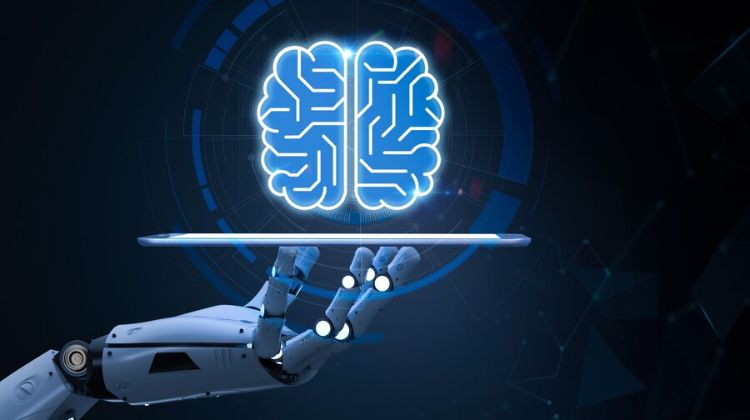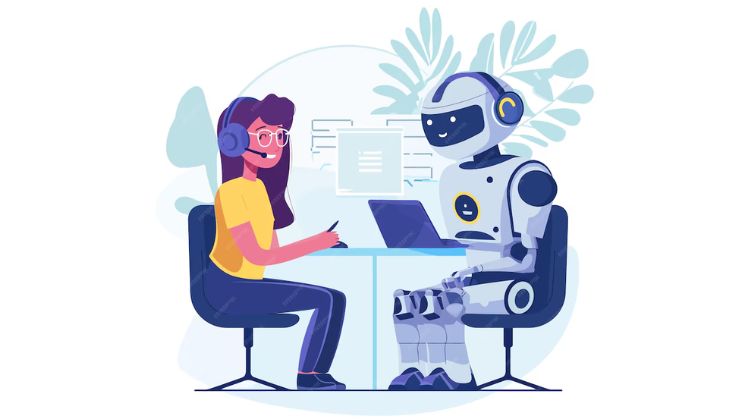
10 minute read
How Important Is AI For Healthcare In Data Science?
Introduction: The Revolutionary Role of AI in Healthcare
In the rapidly evolving field of healthcare, Artificial Intelligence (AI) is becoming a game-changer. The integration of AI into healthcare is transforming the way diseases are diagnosed, treatments are personalized, and patient care is managed. As we look into the future, understanding how AI can revolutionize healthcare through data science is crucial. The combination of AI and data science is paving the way for more accurate diagnoses, efficient treatments, and improved patient outcomes.
If you're considering a career in this transformative field, starting with an Artificial Intelligence Course Free in Noida can provide a solid foundation. These courses offer a cost-effective way to gain the essential knowledge and skills needed to understand and apply AI in healthcare. With a blend of theoretical learning and practical applications, these courses can help you grasp the complexities of AI and its impact on healthcare.
The significance of AI in healthcare lies in its ability to analyze vast amounts of data quickly and accurately. From predicting disease outbreaks to personalizing treatment plans, AI-driven data science is enhancing the capabilities of healthcare professionals. By leveraging AI, we can uncover hidden patterns in data, leading to more effective treatments and better patient outcomes. This not only improves the quality of care but also makes healthcare more accessible and affordable.
In this blog post, we will explore the importance of AI for healthcare in data science. We will delve into two key steps: building a strong foundation in AI and healthcare, and understanding the practical applications of AI in healthcare. Each step will include three sub-steps to provide a comprehensive guide for anyone looking to delve into this exciting field.
Building a Strong Foundation in AI and Healthcare
1. Understanding the Basics of AI and Data Science
Before diving into the specifics of AI in healthcare, it's crucial to understand the basics of AI and data science. These fields form the backbone of modern healthcare innovations. AI involves the creation of algorithms and models that enable machines to perform tasks that typically require human intelligence. Data science, on the other hand, focuses on extracting meaningful insights from large datasets.
To start, enrolling in an Artificial Intelligence Course Free in Noida can be an excellent way to grasp these foundational concepts. Such courses often cover topics like machine learning, neural networks, and data analysis techniques. Understanding these concepts is essential for anyone looking to apply AI in healthcare. The course will introduce you to the tools and technologies used in AI, providing a solid grounding in the basics.
Additionally, it's important to familiarize yourself with the various types of AI used in healthcare, such as supervised learning, unsupervised learning, and reinforcement learning. Each type has its own set of applications and advantages. For instance, supervised learning is commonly used for tasks like medical image analysis, while reinforcement learning can be applied to optimize treatment plans.
By building a strong foundation in AI and data science, you'll be well-prepared to explore the more advanced applications of these technologies in healthcare. This foundational knowledge will enable you to understand the complexities of AI algorithms and how they can be used to solve real-world healthcare problems.
2. Exploring Key AI Techniques Used in Healthcare
Once you have a basic understanding of AI and data science, the next step is to explore the key AI techniques used in healthcare. These techniques are the building blocks of AI applications in the medical field. They include machine learning, natural language processing (NLP), and computer vision.
Machine learning is a subset of AI that focuses on developing algorithms that can learn from and make predictions based on data. In healthcare, machine learning algorithms are used for tasks such as predicting patient outcomes, identifying disease patterns, and personalizing treatment plans. By analyzing large datasets, machine learning models can uncover insights that would be impossible for humans to detect.
NLP, another crucial AI technique, involves the processing and analysis of human language data. In healthcare, NLP can be used to analyze clinical notes, patient reviews, and other unstructured data sources. This allows healthcare providers to extract valuable information from text data, improving the accuracy of diagnoses and the effectiveness of treatments.
Computer vision, a field of AI that focuses on enabling machines to interpret and understand visual data, is also highly relevant to healthcare. Applications of computer vision in healthcare include medical image analysis, disease detection, and surgical assistance. By analyzing medical images, AI algorithms can detect abnormalities and assist doctors in making more accurate diagnoses.
To effectively learn these techniques, consider enrolling in an AI Coaching Near Me in Delhi that offers hands-on projects and practical applications. This will allow you to apply what you've learned to real-world healthcare scenarios, solidifying your understanding and skills.
3. Gaining Practical Experience Through Projects and Internships
Theory alone isn't enough to master AI in healthcare; practical experience is crucial. Working on real-world projects and internships allows you to apply the concepts and techniques you've learned, gain valuable insights, and build a portfolio that showcases your skills. It's like learning to cook; reading recipes is helpful, but you need to get into the kitchen and start cooking to really learn.
Projects can range from simple tasks like building a predictive model for patient readmission rates to more complex challenges like developing a computer vision system for detecting tumors in medical images. By tackling different types of projects, you'll gain a well-rounded understanding of AI in healthcare and develop the ability to solve a variety of problems.
Internships at healthcare institutions or AI companies can also provide valuable hands-on experience. These opportunities allow you to work on real-world problems under the guidance of experienced professionals. Internships not only enhance your technical skills but also provide insights into the practical challenges and considerations of applying AI in healthcare.
An Artificial Intelligence Course Free in Noida programs offer project-based learning and internship opportunities, providing you with the chance to gain practical experience. This hands-on approach is essential for solidifying your understanding and building the skills needed to apply AI in healthcare effectively.
Understanding the Practical Applications of AI in Healthcare
1. Enhancing Diagnostics and Predictive Analytics
One of the most significant applications of AI in healthcare is in diagnostics and predictive analytics. AI algorithms can analyze medical images, lab results, and patient histories to identify patterns and make accurate diagnoses. For example, AI-powered systems can detect early signs of diseases like cancer from medical images, enabling early intervention and better patient outcomes.
Predictive analytics, another crucial application, involves using AI to forecast patient outcomes based on historical data. This can help healthcare providers identify high-risk patients, predict disease outbreaks, and optimize treatment plans. By leveraging AI for predictive analytics, healthcare organizations can improve patient care and reduce costs.
To effectively leverage AI for diagnostics and predictive analytics, it's essential to have a strong foundation in AI and data science. Enrolling in an AI Coaching Near Me in Delhi can provide you with the knowledge and skills needed to understand and apply these techniques. With the right training, you can develop AI models that enhance the accuracy and efficiency of healthcare diagnostics.

2. Personalizing Treatment Plans and Improving Patient Care
AI is also revolutionizing the way treatment plans are personalized and patient care is managed. By analyzing patient data, AI algorithms can recommend personalized treatment plans tailored to each patient's unique needs. This can improve the effectiveness of treatments and reduce adverse effects.
For example, AI can analyze a patient's genetic data, medical history, and lifestyle factors to recommend the most effective treatment for a particular condition. This personalized approach ensures that patients receive the best possible care, improving their outcomes and quality of life.
AI can also enhance patient care by enabling remote monitoring and telemedicine. AI-powered systems can monitor patients' vital signs in real-time, alerting healthcare providers to any abnormalities. This allows for timely interventions and reduces the need for frequent hospital visits, improving patient convenience and reducing healthcare costs.
Enrolling in an Artificial Intelligence Course Free in Noida can help you learn about the various applications of AI in personalized medicine and patient care. With the right training, you can develop AI systems that enhance patient care and improve the overall efficiency of healthcare delivery.
3. Addressing Ethical and Regulatory Challenges
As AI continues to transform healthcare, it's essential to address the ethical and regulatory challenges associated with its use. Issues such as data privacy, algorithmic bias, and the need for transparency must be carefully considered to ensure the responsible use of AI in healthcare.
Data privacy is a significant concern, as AI systems often require access to sensitive patient information. Ensuring that this data is collected, stored, and used securely is crucial for maintaining patient trust. Additionally, AI algorithms must be designed to be transparent and explainable, allowing healthcare providers to understand how decisions are made.
Algorithmic bias is another critical issue, as biased algorithms can lead to unfair and inaccurate outcomes. Ensuring that AI models are trained on diverse and representative datasets is essential for reducing bias and improving the fairness of AI systems.
Regulatory challenges also need to be addressed, as the use of AI in healthcare is subject to various laws and regulations. Understanding these regulations and ensuring compliance is crucial for the successful deployment of AI systems in healthcare.
Enrolling in an AI Coaching Near Me in Delhi can help you learn about the ethical and regulatory challenges associated with AI in healthcare. By understanding these issues and developing responsible AI systems, you can contribute to the safe and effective use of AI in healthcare.
Conclusion: The Transformative Impact of AI on Healthcare
As we look to the future, the importance of AI in healthcare cannot be overstated. The integration of AI and data science is revolutionizing the way diseases are diagnosed, treatments are personalized, and patient care is managed. By building a strong foundation in AI and exploring its practical applications, you can be at the forefront of this transformation.
Enrolling in an Artificial Intelligence Course Free in Noida is a great way to start your journey into the world of AI and healthcare. These courses offer a cost-effective way to gain the essential knowledge and skills needed to understand and apply AI in healthcare. With a blend of theoretical learning and practical applications, these courses can help you grasp the complexities of AI and its impact on healthcare.
Remember, the key to mastering AI in healthcare is a combination of theoretical knowledge, practical experience, and a passion for innovation. Stay curious, embrace challenges, and continuously seek to learn and grow. By doing so, you'll not only contribute to the advancement of healthcare but also position yourself as a valuable asset in this rapidly evolving field.
So, whether you're a student, a professional, or simply someone interested in the intersection of AI and healthcare, now is the time to dive in. The future of healthcare is bright, and AI is leading the charge. Get ready to be part of this exciting journey and make a difference in the world of healthcare!
Also Read This:-

